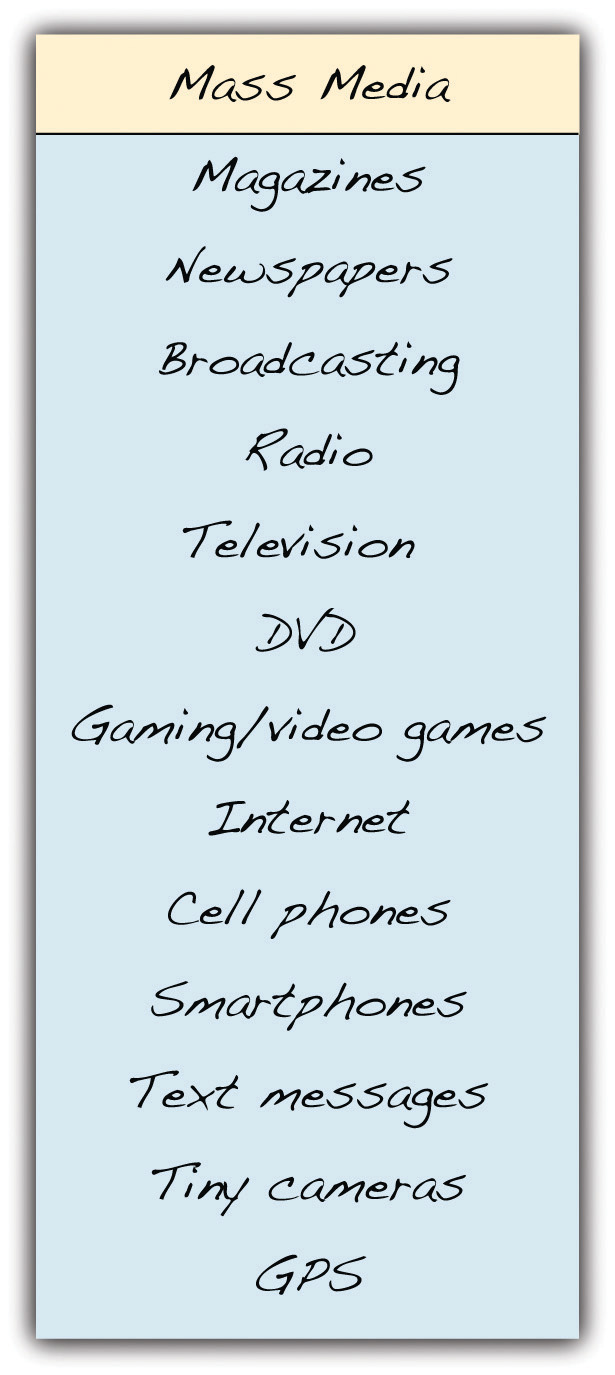Mapping Your Topic
Now that you have developed your topic, research question, and thesis, it is time to develop a framework for your entire paper. At this point, you have not started your research in earnest, but your outline will help guide your research and ensure that you find the resources that will help you prove your thesis.
Brainstorming
Brainstorming is similar to list making. You can make a list on your own or in a group with your classmates. Start with a blank sheet of paper (or a blank computer document) and write your general topic across the top. Underneath your topic, make a list of more specific ideas. Think of your general topic as a broad category and the list items as things that fit in that category. Often you will find that one item can lead to the next, creating a flow of ideas that can help you narrow your focus to a more specific paper topic.
The following is Mariah’s brainstorming list:

Exploring Your Topic in Writing
“How am I supposed to narrow my topic when I haven’t even begun researching yet?” In fact, you may already know more than you realize. Review your list and identify your top two or three topics. Set aside some time to explore each one through freewriting. Simply taking the time to focus on your topic may yield fresh angles.
Jorge knew that he was especially interested in the topic of diet fads, but he also knew that it was much too broad for his assignment. He used freewriting to explore his thoughts so he could narrow his topic. Read Jorge’s ideas.
Our instructors are always saying that accurate, up-to-date information is crucial in encouraging people to make better choices about their health. I don’t think the media does a very good job of providing that, though. Every time I go on the Internet, I see tons of ads for the latest “miracle food.” One week it’s acai berries, the next week it’s green tea, and then six months later I see a news story saying all the fabulous claims about acai berries and green tea are overblown! Advice about weight loss is even worse. Think about all the diet books that are out there! Some say that a low-fat diet is best; some say you should cut down on carbs; and some make bizarre recommendations like eating half a grapefruit with every meal. I don’t know how anyone is supposed to make an informed decision about what to eat when there’s so much confusing, contradictory information. I bet even doctors, nurses, and dietitians have trouble figuring out what information is reliable and what is just the latest hype.
Writing at Work
At work, you may need to research a topic quickly to find general information. This information can be useful in understanding trends in a given industry or generating competition. For example, a company may research a competitor’s prices and use the information when pricing their own product. You may find it useful to skim a variety of reliable sources and take notes on your findings.
Tip
The reliability of online sources varies greatly. In this exploratory phase of your research, you do not need to evaluate sources as closely as you will later. However, use common sense as you refine your paper topic. If you read a fascinating blog comment that gives you a new idea for your paper, be sure to check out other, more reliable sources as well to make sure the idea is worth pursuing.
This chapter is modified from Composing Ourselves and Our World by Auburn University at Montgomery is licensed under a Creative Commons Attribution-NonCommercial 4.0 International License, except where otherwise noted.

